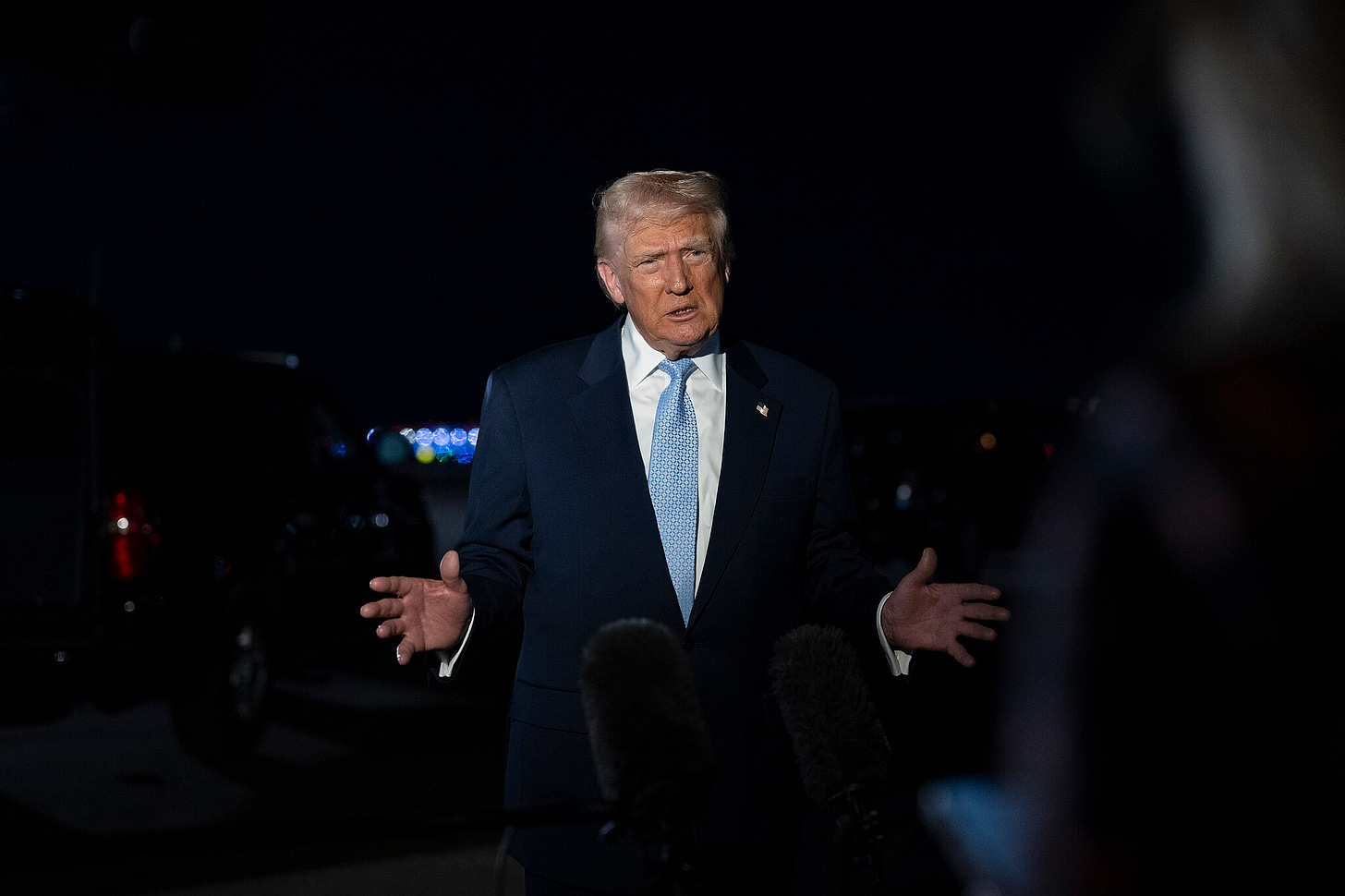The MAGA Coalition Fractures Are Deepening. The Numbers Prove It.
As cracks in the MAGA coalition deepen into fractures, multiple polls show President Trump's disapproval among Republicans hitting double digits, with one poll finding as high as 23% disapproval.

Thank you for reading! In the face of unrelenting disinformation and authoritarian actions, clear truth-telling and independent media are a necessity. If you value pro-democracy journalism, consider becoming a free or paid subscriber to my newsletter. Paid subscribers empower this work and gain access to exclusive benefits. Your support makes a difference.
When people think of MAGA, they might think of a monoculture of Trump fans. But it’s actually a loose coalition that brought Trump back to power in 2024.
Over the course of this year, the cracks within that MAGA coalition have been widening into full-blown fractures under the weight of President Trump’s failures and political weakness.
Trump’s months-long fight to prevent the release of the Epstein files sparked cascading defections within the Republican Party. The firestorm over Tucker Carlson’s platforming of Nick Fuentes’s neo-Nazism has splintered the right. Debates over H-1B visas after Trump’s defense of foreign workers triggered the “America First” crowd. And Trump’s overall political weakness has led Rep. Marjorie Taylor Greene (R-GA) to break with the president on everything from affordability to Israel to the Epstein files.
Why all these fractures? It’s dawning on an increasing number of Republicans that Trump is entering his lame duck era and is failing on multiple fronts. This weakness is providing a permission structure to speak out from within a coalition that used to treat any criticism of President Trump as a betrayal. They can smell weakness, and rightfully so.
Earlier this month, the 2025 elections delivered a forceful rebuke of President Trump as he weighed down the Republican Party in sweeping losses across the country. These Democratic wins were driven by swings to the left among demographics Republicans had made gains with in 2024.
Last week, President Trump’s Decision Desk HQ polling average hit the lowest point of his second term, touching 41.5%. His numbers were dragged down by polls like the latest AP-NORC poll, which found Trump’s approval rating at a stunning low of 36%. This decline, according to the AP, was primarily driven by reduced approval among Republicans.
This poll in particular caught my eye because of the significant disapproval numbers among Republicans. The poll, which surveyed 1,143 adults, found that only 74% of Republicans approved of Trump’s job as president, and 23% disapproved.
It gets worse for Trump. This same poll found that Trump faces a steep drop in Republican approval of how he manages the federal government:
“In March, 81% of Republicans approved of Trump’s management of the federal government; that number has since fallen to 68%. Meanwhile, Democrats remain as opposed as ever, with 95% disapproving of his actions compared with 89% in March.”
When analyzing other recent polls, like the latest Economist/YouGov conducted between November 15 - 17, you see that approval number among Republicans jumps to 85%, but still, that’s a notable double-digit disapproval among Republicans.
I bring up these numbers to showcase that Trump’s weakening support among his own party isn’t just being seen in anecdotal observations - we’re seeing it in the polling.
To dive deeper into these fractures, we have to start with the fight to release the Epstein Files.
The most dramatic rupture within the Republican Party could be seen during the fight to release the Epstein files.
Damning revelations from emails disclosed by the Epstein estate ramped up calls for the full release of the DOJ files. Despite Trump’s efforts to stop a discharge petition last week, including a Situation Room meeting and frantic lobbying, Republican Reps. Boebert, Greene, Massie, and Mace defied him. The petition hit 218 signatures, and it became clear that as many as 100 House Republicans would defect and vote for the release of the files.
For years, MAGA used pedophile conspiracy theories to attack Democrats, but now, Trump was the one fighting to conceal the files related to a real pedophile ring. This caused a huge rift in the base, with MAGA influencers speaking out against President Trump, who increasingly looks like he has something to hide. This defiance has been reflected in the House.
House Republicans were set to defy Trump in large numbers in the Epstein vote. So, Trump pivoted and said he now supports the release of the files. This pivot is less an authentic commitment to transparency and more a capitulation to pressure mounting from his base. Trump wanted to avoid a seismic loss and pretend he backed the Epstein files release. But ahead of the vote on Tuesday, Trump was still calling the Epstein files a “Democratic hoax.”
The looming Epstein files vote led President Trump to send out a disgusting post that sparked even more vocal opposition from his supporters. Trump mocked Rep. Massie for marrying again after his wife died. The responses to that post were among the most negative I’ve ever seen from MAGA Twitter against Trump. People who claimed to support Trump called him “insane,” and others said “MAGA is dead.”
It seems those people finally saw what Trump critics have seen for over a decade: Trump is depraved.
This fight over the Epstein files has brought out the worst in Trump, and is one of the reasons he turned on Marjorie Taylor Greene (MTG). But her case is actually indicative of an even larger rift.
The moment MTG began speaking out on Gaza and affordability, it became clear to me what she was doing. I went on MSNBC and talked about how I felt MTG is one of the only Republicans who sees where this is headed. This wasn’t a moral awakening. It was a political recalibration that recognized Trump’s political weakness. MTG was clearly positioning herself for a post-Trump GOP, I thought. Since then, I think that prediction has been proven true.
MTG is now in an open, public beef with President Trump, who un-endorsed her and called her a “traitor.” During a press conference with Epstein survivors ahead of the House vote to release the Epstein files on Tuesday, MTG directly responded to President Trump:
“I was called a traitor by a man that I fought for five, no, actually, six years for, and I gave him my loyalty for free… I’ve never owed him anything, but I fought for him, for the policies, and for America first, and he called me a traitor for standing with these women and refusing to take my name off the discharge petition.
“Let me tell you what a traitor is. A traitor is an American that serves foreign countries and themselves. A patriot is an American that serves the United States of America and Americans like the women standing behind me now.”
This framing from MTG as her being the real representative of “America First” can be seen in other notable schisms within the MAGA coalition.
The Republican Party has been splintering over Nick Fuentes, the white nationalist who appeared on Tucker Carlson’s podcast. In his appearance, Fuentes talked about the threat of “organized Jewry,” a transparently antisemitic trope. This controversy began a broader debate about how much ethnonationalist extremism, in other words, blatant white supremacy, the GOP is willing to publicly embrace.
President of the Heritage Foundation and Project 2025 architect Kevin Roberts triggered a backlash after he defended Tucker Carlson for platforming Nick Fuentes. This was no small beef. Figures like Ben Shapiro spoke out:
“The issue here isn’t that Tucker Carlson had Nick Fuentes on his show last week. He has every right to do that, of course,” Shapiro said. “The issue here is that Tucker Carlson decided to normalize and fluff Nick Fuentes and that the Heritage Foundation then decided to robustly defend that performance…
The main agent in that normalization is Tucker Carlson, who is an intellectual coward, a dishonest interlocutor, and a terrible friend.”
This exposed a deep divide inside the modern right. This isn’t just about policy over the U.S.’s support for Israel. This is about whether or not the Republican Party will allow the open embrace of disgusting neo-Nazis within their party. Of course, the Trump Administration often flirts with these ideas and enacts policies people credibly argue pursue white nationalist goals, such as Stephen Miller’s mass deportations, for example. But embracing someone who has openly praised Hitler and spews vile attacks on Jews, like Nick Fuentes, is seen as a bridge too far for some establishment Republicans.
But over the weekend, President Trump weighed in, defending Tucker Carlson’s interview with Nick Fuentes. Not too far for Trump, I suppose. That will surely not quell the divisions.
Speaking of nativist “America First” policies, another noteworthy fracture developing is one I’ve written about before: H-1B visas.
In December, Elon Musk and Vivek Ramaswamy set off a debate over H-1B visas by essentially saying tech companies like to hire foreign workers because Americans raise their kids to be mediocre. Musk went further, insulting members of Trump’s base. At the time, this angered Steve Bannon. You can read more about that episode in this piece I wrote days before Trump took office, predicting how these cracks in the MAGA coalition would complicate Trump’s term:
That early Bannon-Musk beef foreshadowed struggles to come.
Last week, President Trump caused another wave of MAGA strife when he defended H-1B visas by claiming America doesn’t have enough talented workers.
This erupted outrage within MAGA, with even ardent Trump supporter Kevin Sorbo saying, “What an atrocious thing to say. This will cost republicans the midterms.”
Podcaster and comedian Tim Dillon, whose interview with J.D. Vance in 2024 helped the Trump Campaign reach young male voters, blasted President Trump after his embrace of H-1B visas:
“Let’s look at Trump here, and I do think, unfortunately, this is, kind of is the end of — and I say unfortunately, not because I care, truly — but I say unfortunately because it seems to not be doing anything good for anyone.
This is the end of the Trump administration. This is the beginning of the lame duck presidency. It’s obvious to everyone, even his most ardent supporters show up to the White House like Laura Ingraham, she’s kind of shocked, like, “What the hell is going on?” Now we’ll start three years of talking about the ballroom. He will trail off, he’ll get older, he’s adorned the White House in gold. Epstein’s gonna suck the oxygen out of a lot of this…”
This is something I’ve been arguing for a while now. President Trump is a weak, lame duck president. It appears now that many Republicans are beginning to reckon with this fact.
As Abraham Lincoln once said, “You can fool some of the people all of the time, and all of the people some of the time, but you can not fool all of the people all of the time.”
Slowly but surely, more Americans are seeing through Trump’s con. We’ll see how this plays out, but if these trends continue, Republicans are looking weak heading into 2026 and 2028.






Loving the sound of a fracturing MAGA. I can't help but be frustrated and confused by the number of people who *still* approve of this disgusting man. If the APNORC poll is representative, then 74% of republicans approve of the job he's doing. Just wondering how much of that is tuned out apathy or ignorance? It's chilling to think that many people could be fully informed yet still support him.